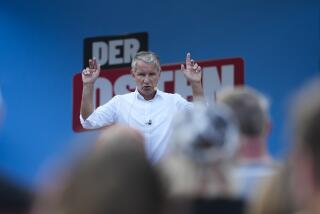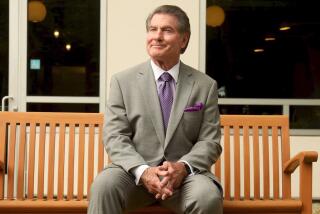Profile : Israel’s Pit Bull of Politics Takes on Jerusalem Mayor : Ehud Olmert is a fierce fighter. But when he faces revered Teddy Kollek this fall, he will be the underdog.
- Share via
JERUSALEM — Ehud Olmert has long been the pit bull of Israel’s right-wing Likud Party, always ready to tear into a political foe, feared for his ability to savage those he sees as compromising the country’s interests and known for his skill in back-room deals that left Likud’s opponents raging but impotent.
“For the things we believe in, above all for the Land of Israel, I will fight, and with all my strength,” Olmert said, relishing a reputation earned in his 20 years in politics. “I’ve not missed a single big political battle in two decades, and I guess I am about to launch into another.”
This time, however, Olmert is facing off against the most revered of Israel’s practicing politicians, Jerusalem Mayor Teddy Kollek, in this autumn’s municipal elections. And for all his fearsomeness, Olmert is still quite the underdog.
Forget that at 82--and with 28 years in office--even Kollek has acknowledged that he should retire. “Only a fool would run at my age, and only a fool would vote for him if he did,” Kollek remarked last year before Prime Minister Yitzhak Rabin persuaded him to run again in an effort to hold Jerusalem for the Labor Party.
Forget that Jerusalem’s accumulating problems--a declining school system, little affordable housing, crime, ethnic tensions, religious friction, traffic congestion, slow economic development--have turned most of the Jewish residents against Kollek’s administration of the city, according to several recent opinion surveys.
And forget that Jerusalem’s future has emerged as the most difficult issue in Israel’s negotiations with the Palestinians on self-government, thus putting a priority on Israeli resolve and unity of purpose and pushing more residents toward Likud’s hard-line stance than toward Labor’s softer approach.
“Teddy will be very tough to beat,” Olmert said over coffee at the Knesset, Israel’s Parliament, where he is one of the longest-serving members. “People identify Teddy Kollek with Jerusalem. He has acquired almost mythic stature and, in the process, he has probably become the most famous mayor in the world.
“But people have to ask themselves whether Teddy, who was a great mayor for many years, will be great in the year 2000, whether he has the strength and the vision to see Jerusalem through what will be a very tumultuous period, whether he can even cope with today’s problems.”
What Jerusalem needs, the 48-year-old lawmaker likes to say, is a “young Teddy Kollek,” and that is one image he will present to voters over the next four months, trying to transform his Likud aggressiveness into a nonpartisan promotion of the city’s interests.
“I don’t want to run the city on a party basis,” Olmert said. “Teddy was right in this. The task in Jerusalem, more than anywhere else in Israel, is to draw people into the city’s development as a common cause, not to divide and alienate them.”
Olmert also intends to turn the city’s future into a major election issue.
“The most fundamental national consensus is on unified Jerusalem as Israel’s eternal capital,” Olmert said, “and personally I don’t think we should make any concession. But we must work out our position--Jerusalem’s own special, unique position--and present it far more vigorously to win its international acceptance.”
Olmert also expects to use his experience as a Cabinet member in previous governments to argue that he can manage the city better than Kollek has.
“We have to feed people, improve the quality of life, repair the streets and end the chaos in our schools,” Olmert said. “Teddy has long been bored with the day-to-day matters, though they affect people the most. He is interested in the big projects, the fund raising and building on a colossal scale.
“Teddy lacks the patience, the time and the interest to deal with transport, with job creation, with economic development. These are things that you can’t put a plaque on and say, ‘Gift of Shimon Stein of Brooklyn’ or whatever. I do have the ability, patience and experience to get things done.”
The final issue that Olmert plans to press may prove the most controversial: closing the wide gap in municipal services between Jewish and Arab neighborhoods.
“Teddy talks about a ‘united Jerusalem,’ but walk the streets and you will see that in (Arab) East Jerusalem it is just not so in real terms,” Olmert said. “We need to invest very substantially in the infrastructure and services on the east side to improve the quality of life there.”
Olmert argues that if Israel truly intends to retain the Arab areas of Jerusalem--which Palestinians seek as the capital for the state they hope to establish on the West Bank and Gaza Strip--it must go much further in integrating those neighborhoods into the city as a whole.
“In leaving the Arabs as our poor relatives, we are encouraging them to demand separation,” Olmert said. “I don’t believe we will end their hostility or make them patriots of Israel, but in improving their quality of life we are fulfilling a commitment we made in uniting the city (in 1967) and thus strengthening our position.”
Olmert nonetheless expects objections from some Jewish residents who begrudge the parks and playgrounds that the municipality has already built in Arab neighborhoods. He counters with the argument that if the city does not spend this money, the intifada --the Palestinian rebellion against Israeli rule--will move to Jerusalem from the West Bank and Gaza Strip.
But there is more than a little suspicion that Olmert is bidding for the Arab vote, potentially almost 30% of the electorate, as Palestinians debate whether to participate in the November elections. Kollek has said that the Arab votes could prove decisive, but he expressed doubts that the Palestine Liberation Organization would allow the city’s Arab residents to vote in substantial numbers.
Still, Kollek points out at every opportunity that Olmert has declared his support for Jews wanting to move into predominantly Arab sections of Jerusalem, including the Old City’s Muslim Quarter, and suggests that such a change of city policy after 25 years would be provocative.
Kollek’s practice has been to continue the two communities’ segregation to minimize friction and to maintain a ratio of Jews to Arabs of approximately 3 to 1 by restricting Palestinian building and establishing new Jewish neighborhoods, many of them on the east side of the city to match natural Arab population growth.
At the time of Jerusalem’s unification after the 1967 Arab-Israeli War, Kollek “represented a moderate political position” toward the Arabs, Olmert acknowledged, “and won respect for his goodwill, his concern, his tenderness.”
“He did a lot particularly to build relations with religious leaders, Muslim and Christian, and that has proved very important,” Olmert said. “But this impulse has not been translated into real improvements in East Jerusalem, let alone a closing of the gap with West Jerusalem. And Teddy did nothing with the political leaders of East Jerusalem, and that is now hurting the city badly.”
Going into the election campaign, Olmert would appear to have a strong position on paper. Jerusalem is pro-Likud (the party won 25% of Jerusalem votes in last year’s parliamentary elections versus 20% for Labor), and the strong Haredi Orthodox community also supports most Likud policies and Olmert.
“Potentially, we start with 70% of the voters favoring me,” Olmert said. “But, remember, the opponent is Teddy Kollek, and that means I will have to come from behind.”
A public opinion survey made by the Gallup Organization for Olmert last month showed 57% of Jerusalem residents thought Kollek should not run again. Another poll, made for Kollek’s One Jerusalem ticket by the Policy Institute, showed 61% of voters backed Kollek. Israelis are politically volatile, and serious campaigning won’t start until September.
With funds raised in large part in the United States, Olmert is organizing a campaign based on a highly sophisticated use of polling, computer-compiled databases on issues and voters and individualized direct mailings, and he said he is drawing broad support across the political spectrum, including the left.
“People like a newcomer, someone who has not been involved and is not tainted,” Olmert said. “Unfortunately, I have been around so long that Labor’s dossiers on me are quite fat. Everything, in fact, is known about me, and that could be a strong disadvantage.”
The campaign is likely to be “very, very dirty--the worst,” Olmert said. He acknowledged that he will be questioned on the wealth he amassed during his 15 years as a lawyer and member of Parliament and on allegations that he later used his ministerial posts for personal profit.
“They will try to discredit me personally, involve me in scandals, portray me as political profiteer and probably worse,” Olmert said. “The issues are all old, and I have been cleared in each of all wrongdoing. . . . But it will be a fight.”
The political stakes are high. Likud’s new leader, Benjamin Netanyahu, is looking toward the municipal elections as a test of the party’s strength and hoping that victories in key cities will help him force early national elections. Olmert sees victory in Jerusalem as a chance to become an alternative to Netanyahu, should he falter. And for Kollek, it is his “last hurrah,” and he wants to be remembered as a winner.
“Whoever is mayor of Jerusalem has not just national but international impact,” Olmert said. “Any change in Jerusalem after 28 years of Kollek is a very dramatic event. The impact of this municipal election will be felt around the world.”
Biography
* Position: Candidate for mayor of Jerusalem from the Likud Party, a member of Israeli Knesset since 1973, a former minister of health and minister of minorities.
* Age: 48
* Personal: Born in the Israeli market town of Binyamina in British-ruled Palestine, studied philosophy, psychology and law at Hebrew University, attorney in Jerusalem for 15 years. Married, four children, ages 12 to 22.
* Quote: “Teddy Kollek has been a great mayor for Jerusalem, but Teddy belongs to the past and we need a mayor for the future.”
More to Read
Sign up for Essential California
The most important California stories and recommendations in your inbox every morning.
You may occasionally receive promotional content from the Los Angeles Times.










